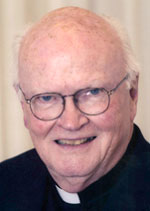Villanova University’s Center for Church Management and Business Ethics celebrated its 10th anniversary in early March by hosting a one-day seminar on campus in cooperation with CARA (the Center for Applied Research in the Apostolate), which marked its 50th year of service to the church.
CARA has been in various locations in the Washington, D.C., area over the years; it is now a free-standing entity at (but not of) Georgetown University.
As those familiar with university life know, any academic with a good idea, letterhead and a file cabinet can initiate a center for the study of just about anything. Chuck Zech, a professor of economics at Villanova, saw the need a decade ago for research into what might be called “best practices” that would enable church organizations to function more efficiently, ethically and productively.
He started conducting that research. He also convinced the dean of the Villanova School of Business that there is a market for a master’s degree program (predominantly online) in church management. Both activities — instructional and research — are underway; a year or so ago the center added business ethics to its program.
Full disclosure prompts me to mention that I serve on the Villanova center’s advisory council. In that capacity, I was invited to participate in the joint seminar celebrating the milestones.
Under the heading of “The Catholic Parish in the 21st Century,” these two rather well-kept secrets in the life of the American church provided a stimulating program for about 200 church types, clergy and lay, on the challenges and opportunities facing the church in the immediate future.
[hotblock]
Melissa Cidade, of CARA, gave an enlightening presentation on the demographics and diversity associated with the American church today.
Her colleague, Mark Gray, addressed the challenges and opportunities associated with Catholic schools and the sacraments. He prompted me to wonder, in view of the downturn in Catholic elementary school enrollment, whether any Catholics in future years will realize that guardian angels are not citizen patrols but celestial companions who can be relied upon for protection and guidance.
Jesuit Father Thomas Gaunt, CARA’s executive director, outlined CARA’s approach to research design and financial support.
Professor Zech gave specifics about stewardship and the uses and abuses of parish finances. He had predicted, not long after the clergy sexual abuse scandal rocked the church more than a decade ago, that disclosures of financial fraud and embezzlement would soon surface as a troubling issue. He was right.
Keynoting the conference was Father Michael White, a pastor in suburban Baltimore who has tripled weekend attendance at his parish. He highlighted three keys to growth for the Catholic parish in the years ahead. They are: music, message (the homily) and ministers (welcoming ministers when worshippers arrive and parking-lot facilitators who ease their arrivals). It struck me that a forth “m” needs attention — the meal.
We are there to remember the Lord in the breaking of the bread. We become one in the one loaf and the one cup, which are ours to share. We need more effective catechesis on the meaning of that meal.
There is no question of the need of better music and improved homilies. But without deeper understanding of the Eucharist, we could wind up with mega-parishes and malnourished parishioners.
—
Jesuit Father Byron is university professor of business and society at St. Joseph’s University in Philadelphia. Email: wbyron@sju.edu.




The Religiion texts became warm and fuzzy around the seventies . There was a loss of reverence for the Mass, and hence the Eucharist. It was our “Family Meal”, all of a sudden instead of the Sacrifice of the Mass, in imitation of Calvary. Perhaps that is why there seems to be a lack of real respect for the Sacrament in church today, shown by the behavior of the congregation, talking at Mass, disrespectful dress by adults and children, etc. One can only hope that somehow this will be remedied.
Thank you.